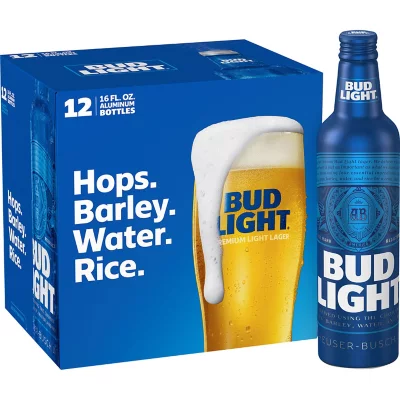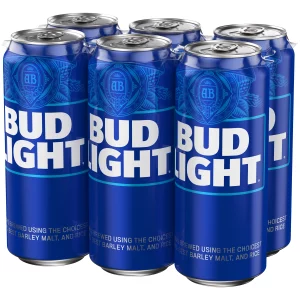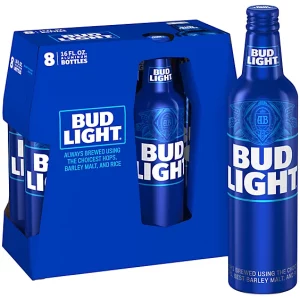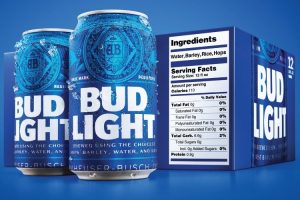Bud Light calories 16 oz is a popular topic of discussion for beer enthusiasts and those who are health-conscious. Beer lovers often want to know the calorie count of their favorite beers, especially if they are watching their weight or trying to maintain a healthy lifestyle.
Bud Light, which is one of the most widely consumed beers in the world, has become a subject of interest in this regard. This light beer, with its refreshing taste and low-calorie count, has gained popularity among those who want to indulge in a drink without worrying too much about calorie intake.
In this article, we will delve into the nutritional information of Bud Light beer, specifically its calorie count per 16 oz can, and explore how it fits into a healthy lifestyle.
Bud Light beer and its popularity
Bud Light is a light beer that is brewed by Anheuser-Busch InBev, one of the largest brewing companies in the world. It was first introduced in 1982 as a response to the growing demand for low-calorie beers. Bud Light quickly became popular due to its refreshing taste and low-calorie count, making it a popular choice for people who want to enjoy a beer without worrying too much about their waistline.
Over the years, Bud Light has become one of the most widely consumed beers in the United States and around the world. It is often seen at sporting events, parties, and social gatherings, and has even been featured in popular culture through commercials and sponsorships. Its popularity can be attributed to its light and refreshing taste, low-calorie count, and widespread availability.
Bud Light’s popularity has also been driven by its various flavor variations, such as Bud Light Lime and Bud Light Platinum. These variations offer consumers different taste options while still providing a low-calorie beer option. Overall, Bud Light’s popularity can be attributed to its light and refreshing taste, low-calorie count, and widespread availability, making it a favorite among many beer drinkers.
What are calories and why are they important to monitor?
Calories are units of energy that are commonly used to measure the amount of energy in food and drinks. When we consume food or drinks, our bodies break down the macronutrients (carbohydrates, proteins, and fats) to produce energy. The amount of energy produced by these macronutrients is measured in calories.
Monitoring calorie intake is important for maintaining a healthy weight and overall health. Consuming too many calories without burning them off through physical activity can lead to weight gain, which in turn can increase the risk of developing health issues such as heart disease, diabetes, and certain types of cancer. On the other hand, consuming too few calories can lead to malnutrition and other health problems.
Therefore, it is important to monitor calorie intake and ensure that it is balanced with physical activity and other lifestyle factors. This balance can help maintain a healthy weight, promote overall health, and reduce the risk of developing chronic diseases.
In the context of beer consumption, monitoring calorie intake can help individuals make informed decisions about how much and what type of beer to drink, especially if they are trying to maintain a healthy weight.
Nutritional information of a 16 oz can of Bud Light beer
A 16 oz can of Bud Light beer contains 110 calories, 6.6 grams of carbohydrates, 0 grams of fat, and 0.9 grams of protein. It also contains 0 grams of sugar and 0% of the daily recommended value of fiber, vitamin D, calcium, iron, and potassium.
Compared to other beers, Bud Light has a relatively low-calorie count, which is one of the reasons it has become popular among those who want to enjoy a drink without consuming too many calories. However, it is important to note that alcohol itself contains calories, and drinking too much alcohol can still lead to weight gain and other health issues.
It is also worth mentioning that while Bud Light has a low-calorie count, it is still an alcoholic beverage and should be consumed in moderation.
The American Heart Association recommends that men should consume no more than two drinks per day, and women should consume no more than one drink per day, to maintain a healthy lifestyle. Drinking too much beer or any other alcoholic beverage can have negative health effects, regardless of its calorie count.
How does Bud Light’s calorie count compare to other beers?
Bud Light’s calorie count is relatively low compared to many other beers. For example, a 16 oz can of regular Budweiser beer contains 145 calories, while a 16 oz can of Heineken beer contains 170 calories. A 16 oz can of Guinness beer contains 170 calories, and a 16 oz can of Sierra Nevada Pale Ale contains 220 calories.
There are also many higher-calorie beers available, such as craft beers and specialty brews, that can contain over 300 calories per serving. These higher-calorie beers may be delicious, but they can also contribute significantly to overall calorie intake and can make it harder to maintain a healthy weight.
Overall, Bud Light’s low-calorie count makes it a popular choice for those who want to enjoy a beer without consuming too many calories. However, it is important to remember that moderation is key when it comes to alcohol consumption, regardless of the calorie count.
The impact of alcohol content on calorie count
Alcohol content can have a significant impact on the calorie count of a beer. Generally, the higher the alcohol content, the higher the calorie count. This is because alcohol itself contains calories, and higher alcohol content means more calories from alcohol.
For example, a 12 oz can of regular Budweiser beer contains 5% alcohol by volume (ABV) and 145 calories. On the other hand, a 12 oz can of Budweiser Select 55, which has a lower alcohol content of 2.4% ABV, contains only 55 calories.
It is worth noting that while lower alcohol content beers may have fewer calories, they may also have a lower overall taste profile and may not be as satisfying to drink. This can lead to drinking more beer overall to compensate for the lower alcohol content, which can increase calorie intake.
Overall, when it comes to beer and calorie intake, it is important to consider both the alcohol content and the overall calorie count. Choosing lower alcohol-content beers and drinking in moderation can help reduce overall calorie intake and promote a healthy lifestyle.
How to calculate the number of calories in a serving of beer
Calculating the number of calories in a serving of beer can be done using the following formula:
(Number of ounces of beer x alcohol by volume (ABV) x 1.6) + (Number of ounces of beer x carbohydrate content x 3.6)
The first part of the formula calculates the number of calories from alcohol, while the second part calculates the number of calories from carbohydrates.
To use the formula, you will need to know the number of ounces in a serving of beer, the ABV of the beer, and the carbohydrate content of the beer. This information can usually be found on the label or on the brewery’s website.
For example, let’s calculate the number of calories in a 12 oz can of Bud Light beer, which has an ABV of 4.2% and a carbohydrate content of 6.6 grams:
(12 x 0.042 x 1.6) + (12 x 6.6 x 3.6) = 51.8 calories from alcohol + 283.2 calories from carbohydrates = 335 calories total.
Therefore, a 12 oz can of Bud Light beer contains approximately 335 calories. Keep in mind that this formula is an estimate, and the actual calorie count may vary slightly based on the specific beer and the brewing process.
Understanding the concept of “empty calories” in relation to beer consumption
The concept of “empty calories” refers to calories that come from foods or beverages that provide little to no nutritional value. Beer is often considered to be a source of empty calories because it contains calories from alcohol and carbohydrates but provides little in the way of vitamins, minerals, or other essential nutrients.
When consumed in moderation, beer can be a part of a healthy diet. However, excessive consumption of beer and other alcoholic beverages can lead to weight gain, poor nutrition, and other health issues.
One way to minimize the impact of empty calories from beer consumption is to choose lower-calorie options like light beers or beers with lower alcohol content. This can help reduce overall calorie intake while still allowing for the enjoyment of a cold beer.
It is also important to note that while beer may be a source of empty calories, it can still be part of a balanced lifestyle. Enjoying a beer with friends or as a treat on occasion can be a fun and enjoyable part of life, as long as it is done in moderation and balanced with a healthy diet and lifestyle.
Does drinking Bud Light in moderation fit into a healthy lifestyle?
Drinking Bud Light in moderation can fit into a healthy lifestyle for most people. Moderation typically means up to one drink per day for women and up to two drinks per day for men, according to the Centers for Disease Control and Prevention.
Bud Light is a lower-calorie option compared to many other beers, which can make it a good choice for those who want to enjoy a beer while still managing their calorie intake. A 12 oz can of Bud Light contains 110 calories, which is less than many other beers on the market. However, it is important to remember that alcohol itself contains calories, so moderation is still key.
It is also important to consider factors like overall diet and lifestyle when incorporating beer or other alcoholic beverages into your routine. Consuming a balanced diet and getting regular exercise is important for maintaining a healthy lifestyle.
Overall, drinking Bud Light in moderation can be part of a healthy lifestyle for most people. However, it is important to be mindful of overall calorie intake and to consume alcohol in moderation to avoid negative health effects.
How many Bud Light beers can you consume without exceeding your daily calorie intake?
The number of Bud Light beers you can consume without exceeding your daily calorie intake depends on your individual calorie needs and how many calories you have already consumed from other sources throughout the day.
Assuming a daily calorie intake of 2000 calories, which is a common standard, a 12 oz can of Bud Light contains 110 calories. This means that you could consume approximately 18 cans of Bud Light in a day and still stay within your daily calorie intake.
However, it is important to note that consuming large amounts of alcohol can have negative effects on your health, regardless of calorie intake. It is recommended that men consume no more than two drinks per day and women consume no more than one drink per day to stay within safe and moderate alcohol consumption guidelines.
It is also important to consider factors like overall diet and lifestyle when incorporating beer or other alcoholic beverages into your routine. Consuming a balanced diet and getting regular exercise is important for maintaining a healthy lifestyle.
Can Bud Light beer help you lose weight or maintain a healthy weight?
While Bud Light is a lower-calorie beer compared to many other options on the market, it is important to remember that it still contains calories from alcohol and carbohydrates. Consuming too many calories, whether from beer or other sources, can lead to weight gain.
However, incorporating Bud Light into a balanced diet and exercise routine in moderation can potentially help with weight loss or weight maintenance goals. Choosing lower-calorie options like Bud Light can be a helpful strategy for managing overall calorie intake.
It is important to note that weight loss and weight maintenance are complex processes that depend on a variety of factors, including overall diet, exercise habits, and individual metabolism. Consuming beer or other alcoholic beverages should always be done in moderation and balanced with a healthy lifestyle to achieve and maintain a healthy weight.
How does Bud Light beer impact your body’s metabolism?
Bud Light, like other alcoholic beverages, can impact your body’s metabolism in several ways.
First, alcohol is metabolized by the liver, which takes priority over other metabolic processes in the body. This means that when you consume alcohol, your body will focus on metabolizing the alcohol first before metabolizing other nutrients from food or drinks.
Additionally, consuming alcohol can impact your body’s blood sugar levels, as alcohol is quickly converted into glucose in the bloodstream. This can lead to a temporary increase in blood sugar levels, followed by a drop in blood sugar as the body works to metabolize the alcohol.
Alcohol consumption can also impact the body’s hydration levels, as alcohol is a diuretic that can cause increased urine output and lead to dehydration. This can impact the body’s overall metabolism, as dehydration can slow down metabolic processes and lead to decreased energy levels.
Finally, it is important to note that alcohol consumption can impact sleep quality, which can in turn impact metabolic processes in the body. Lack of sleep can lead to decreased metabolism and increased appetite, which can contribute to weight gain and other negative health outcomes.
Overall, while Bud Light is a lower-calorie beer option, it is important to consume alcohol in moderation and balance it with a healthy lifestyle to support optimal metabolic function.
Recommended:
- How to get drunk without drinking a lot
- What does an old fashioned taste like?
- Wine that goes with fish
- Does wine have yeast?
Is Bud Light beer suitable for people with dietary restrictions or health concerns?
Bud Light beer contains gluten, so it is not suitable for people with celiac disease or gluten intolerance. However, the brand also offers a gluten-free beer option called Bud Light Seltzer, which may be a suitable alternative for those with gluten restrictions.
Additionally, Bud Light is an alcoholic beverage and should be consumed in moderation, particularly for those with health concerns like liver disease, diabetes, or high blood pressure. Alcohol consumption can exacerbate these conditions and increase the risk of negative health outcomes.
It is always important to consult with a healthcare professional if you have dietary restrictions or health concerns to determine if consuming Bud Light or other alcoholic beverages is safe for you.
Conclusion
Here on this page, you can get to learn more about bud light calories 16 oz. Bud Light is a popular beer brand that is known for its lower calorie content, with a 16 oz can containing around 170 calories. While this can make it a suitable option for those looking to manage their calorie intake, it is important to consume alcohol in moderation and balance it with a healthy diet and exercise routine.
Additionally, individuals with dietary restrictions or health concerns should consult with a healthcare professional before consuming Bud Light or other alcoholic beverages.




